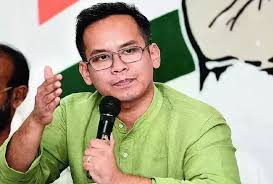Congress MP Gaurav Gogoi has sharply criticized the Assam government’s recent application in the Supreme Court against the National Register of Citizens (NRC). The government, led by Chief Minister Himanta Biswa Sarma, has sought to challenge the Supreme Court’s ongoing monitoring of the NRC process, a move Gogoi perceives as politically motivated and detrimental to the interests of the people of Assam.
Gogoi has voiced his concerns about the implications of the Assam government’s actions. He believes that the state government is attempting to divert attention from its failures in addressing pressing issues faced by the citizens. By filing this application, the government not only undermines the Supreme Court’s authority but also raises questions about its commitment to transparency and accountability regarding the NRC process. Gogoi argues that the government should focus on providing solutions to the genuine concerns of the people rather than engaging in legal battles that may further complicate the already sensitive situation surrounding the NRC.
The NRC process aims to identify genuine Indian citizens residing in Assam, a task fraught with complexities and controversies. Gogoi emphasizes that the Congress party has consistently supported the NRC’s objectives, believing in the necessity of having a robust system to differentiate between citizens and illegal immigrants. However, he criticizes the Assam government’s approach, stating that their actions have only contributed to confusion and uncertainty. He asserts that instead of fostering a sense of security among the residents, the government’s application only instills fear and anxiety, particularly among those who are concerned about their citizenship status.
In his remarks, Gogoi highlights the importance of upholding the Supreme Court’s role in overseeing the NRC process. He contends that the court’s involvement is crucial in ensuring fairness and justice for all individuals, particularly those belonging to marginalized communities. By challenging the Supreme Court’s authority, the Assam government risks alienating these communities, further exacerbating existing tensions and divisions within the state. Gogoi calls for a united approach, urging the government to engage in dialogue and cooperation rather than confrontation.
Furthermore, Gogoi questions the timing of the government’s application, suggesting that it may serve as a distraction from other pressing issues affecting Assam. The state grapples with various challenges, including economic instability, unemployment, and the impacts of the COVID-19 pandemic. Gogoi believes that the government’s focus should shift toward addressing these pressing matters instead of entangling itself in legal disputes over the NRC. He asserts that the government has a responsibility to prioritize the welfare of its citizens and to take concrete steps to improve their quality of life.
In response to the government’s application, Gogoi has rallied support from various quarters, urging fellow legislators and concerned citizens to voice their opposition. He emphasizes the need for a collective response against what he perceives as an attempt to undermine the democratic processes in the state. Gogoi’s call to action resonates with many who share his concerns about the implications of the government’s actions on the future of Assam and its residents.
Gogoi also stresses the need for transparency and clarity in the NRC process. He insists that the government must communicate openly with the public, providing accurate information about the status of the NRC and addressing any misconceptions that may arise. Clear communication can help alleviate fears and uncertainties among the populace, fostering a sense of trust and collaboration between the government and its citizens.
As the debate surrounding the NRC continues, Gaurav Gogoi remains vocal in his opposition to the Assam government’s actions. He believes that the focus should remain on fostering unity and understanding among the people of Assam. Rather than deepening divisions and uncertainty, the government should work toward building a harmonious society where every individual feels secure in their citizenship. Gogoi’s stance highlights the broader challenges facing the region, where the quest for identity and belonging remains a central issue.

